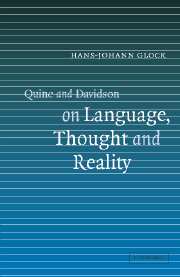Book contents
1 - Logical pragmatism
Published online by Cambridge University Press: 22 September 2009
Summary
This chapter provides a general introduction to Quine and Davidson. The first two sections are devoted to the historical context. I shall argue that the philosophical roots of their work are two-fold, namely formal logic and logical positivism on the one hand, American pragmatism and behaviourism on the other. It is not my ambition, however, to trace the details of actual historical influence. For my purposes it suffices to show that Quine and Davidson combine problems and methods bequeathed by logical positivism with important pragmatist themes, and that they can profitably be labelled as logical pragmatists. Sections 3 and 4 sketch the main features, respectively, of Quine's and Davidson's work, and highlight some important similarities and differences. The final section argues that their philosophies culminate in a philosophical anthropology, a conception of human behaviour in general, and of linguistic behaviour in particular.
The impact of logical positivism
Quine was born in 1908. He took his B.A. from Oberlin College and entered Harvard as a graduate in 1930. With the exception of several prolonged visits to other universities, he stayed there until his death in 2000. Davidson, born in 1917, was Quine's pupil at Harvard; he later held posts at Stanford, Rockefeller, Chicago and Berkeley.
Quine initially majored in mathematics. At Harvard, under the guidance of A. N. Whitehead, C. I. Lewis and Samuel Sheffer, he specialized in the function-theoretic logic invented by Frege and Russell. In 1933 he visited Vienna, Prague and Warsaw.
- Type
- Chapter
- Information
- Quine and Davidson on Language, Thought and Reality , pp. 13 - 39Publisher: Cambridge University PressPrint publication year: 2003

